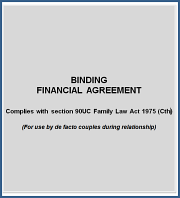
You can decide how your assets will be divided by using a Binding Financial Agreement.
So, you have decided to be the captain of your own destiny and enter into a Financial Agreement.
Financial Agreements are a great way to record how a couple wish to deal with their assets in the event the relationship comes to an end.
In the past, these types of Agreements were only available to married couples, now they can be used by de facto and same sex couples at any stage of a relationship.
- either before marriage or moving in together,
- during the relationship or
- when the relationship has ended to finalise the financial side of things.
This makes Financial Agreements more accessible than ever, placing the power and control directly with couples to determine how their own financial affairs will be handled, rather than relying on the Court.
While it may be tempting to skip the boring legal stuff and jump straight into drafting and signing your Agreement, it’s important to be aware that there are certain situations in which a court can intervene and set aside a Financial Agreement.
Here are some important points to consider to help ensure your Financial Agreement will stand up if it is ever challenged:-
Make sure you have complied with the procedures set out in section 90G (90UJ for de facto couples) of the Family Law Act. To be binding:-
- the Financial Agreement must be signed by all parties;
- each party must have received independent legal advice before signing the Agreement;
- either before or after signing the agreement, each party received a signed statement by the solicitor stating that the party received the necessary legal advice and each party provided a copy of their statement to the other party; and
- the Financial Agreement must not have been later terminated by the parties by a Termination Agreement or new Financial Agreement or set aside by a Court.
![]() RP Emery and Associates Legal Review Package helps you to comply with the legal advice requirements simply at a fraction of the normal cost.
RP Emery and Associates Legal Review Package helps you to comply with the legal advice requirements simply at a fraction of the normal cost.
Think about the roles you will be taking on in the relationship and any non-financial contributions.
- How will they be adequately provided for? Will you be working, a carer for children, supporting your partner? Make sure these contributions are recognised and valued.
Make sure that you are transparent in your dealings.
Section 90K (90UM for de facto couples) lists the circumstances in which a court may set aside a financial agreement, including circumstances where:-
- The agreement has been obtained by fraud. This includes where a party has not made full and frank disclosure about the extent of their assets at the time of making the Agreement. Failure to disclose the true extent of your financial position constitutes ‘fraud’ and your Agreement may be set aside if a party decides to challenge it in court at a later date.
You will note that the Financial Agreement contained in RP Emery and Associates Kit provides comprehensive schedules for each party to make full disclosure as to their assets and liabilities. It is there for a reason – you should complete it fully and accurately! - A party entered into the agreement to defraud others or defeat a creditors. You cannot use a Financial Agreement to transfer assets to a partner to get out of paying your debts.
- The agreement is void, voidable or unenforceable. This includes, for example, things like being mistaken as to the terms of the Agreement, the Agreement is incomplete or there has been duress, unconscionable conduct or undue pressure on one party to sign the Agreement.
- Circumstances have arisen since the Agreement was made which make it impractical be for the agreement or part of it to be carried out.
It is vital that you regularly review your Financial Agreement. If your circumstances have changed so that your Agreement cannot be carried out, for example, where a substantial asset no longer exists, your Agreement may potentially be set aside. You should take steps to update it to ensure your needs are still being met effectively. Consider: a financial agreement provides that Partner A will be entitled to the matrimonial home, and Partner B will be entitled to the Investment Property in the event the relationship ends. The Investment Property has long since been sold and the proceeds have been poured into a business venture of Partner A. This Agreement would most likely be set aside if challenged.
Consider: a financial agreement provides that Partner A will be entitled to the matrimonial home, and Partner B will be entitled to the Investment Property in the event the relationship ends. The Investment Property has long since been sold and the proceeds have been poured into a business venture of Partner A. This Agreement would most likely be set aside if challenged. - Since the making of the agreement, a material change in the circumstances has occurred relating to the care, welfare and development of a child to the relationship and the child or partner will suffer hardship if the court does not set the agreement aside. If your circumstances have changed considerably, you should review your Agreement to ensure that you are adequately provided for.
 Consider: a married couple, both working and financially independent when their Financial Agreement was originally drafted to state that each partner is individually entitled to their own assets and earnings.Now, 10 years later, one partner to the relationship has given up their successful career and opportunity to continue to build assets and superannuation, and has been staying at home for the last 6 years to raise children of the relationship and/or support the other partner. If mechanisms are not in place to ensure that the carer and/or the children are not adequately provided for, this Agreement would most likely be set aside.
Consider: a married couple, both working and financially independent when their Financial Agreement was originally drafted to state that each partner is individually entitled to their own assets and earnings.Now, 10 years later, one partner to the relationship has given up their successful career and opportunity to continue to build assets and superannuation, and has been staying at home for the last 6 years to raise children of the relationship and/or support the other partner. If mechanisms are not in place to ensure that the carer and/or the children are not adequately provided for, this Agreement would most likely be set aside.
You should take the time to review your Financial Agreement if children are
 born.
born. - A party was engaged in unconscionable conduct in making the agreement.
So, there you have it, a summary of the law relating to Financial Agreements and the steps you can take to make sure your best interests are protected. We understand that many of these points won’t be an issue for most people, however, it is important to be aware of them.
If you would like to read more or want to know more information about the Financial Agreement Kits and Document Review Service offered by RP Emery & Associates, click here

